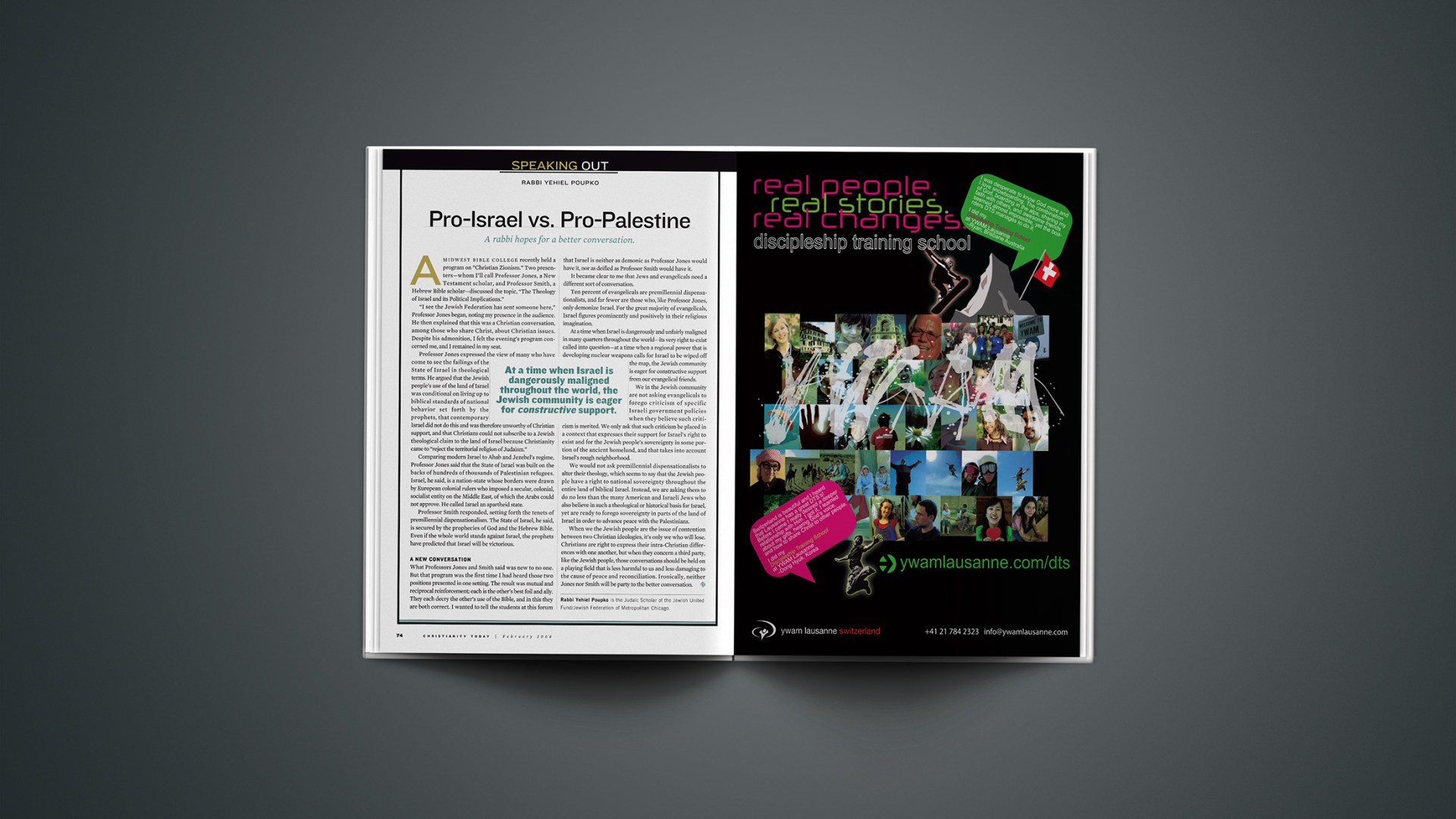A Midwest bible college recently held a program on “Christian Zionism.” Two presenters—whom I’ll call Professor Jones, a New Testament scholar, and Professor Smith, a Hebrew Bible scholar—discussed the topic, “The Theology of Israel and its Political Implications.”
“I see the Jewish Federation has sent someone here,” Professor Jones began, noting my presence in the audience. He then explained that this was a Christian conversation, among those who share Christ, about Christian issues. Despite his admonition, I felt the evening’s program concerned me, and I remained in my seat.
Professor Jones expressed the view of many who have come to see the failings of the State of Israel in theological terms. He argued that the Jewish people’s use of the land of Israel was conditional on living up to biblical standards of national behavior set forth by the prophets, that contemporary Israel did not do this and was therefore unworthy of Christian support, and that Christians could not subscribe to a Jewish theological claim to the land of Israel because Christianity came to “reject the territorial religion of Judaism.”
Comparing modern Israel to Ahab and Jezebel’s regime, Professor Jones said that the State of Israel was built on the backs of hundreds of thousands of Palestinian refugees. Israel, he said, is a nation-state whose borders were drawn by European colonial rulers who imposed a secular, colonial, socialist entity on the Middle East, of which the Arabs could not approve. He called Israel an apartheid state.
Professor Smith responded, setting forth the tenets of premillennial dispensationalism. The State of Israel, he said, is secured by the prophecies of God and the Hebrew Bible. Even if the whole world stands against Israel, the prophets have predicted that Israel will be victorious.
A New Conversation
What Professors Jones and Smith said was new to no one. But that program was the first time I had heard those two positions presented in one setting. The result was mutual and reciprocal reinforcement; each is the other’s best foil and ally. They each decry the other’s use of the Bible, and in this they are both correct. I wanted to tell the students at this forum that Israel is neither as demonic as Professor Jones would have it, nor as deified as Professor Smith would have it.
It became clear to me that Jews and evangelicals need a different sort of conversation.
Ten percent of evangelicals are premillennial dispensationalists, and far fewer are those who, like Professor Jones, only demonize Israel. For the great majority of evangelicals, Israel figures prominently and positively in their religious imagination.
At a time when Israel is dangerously and unfairly maligned in many quarters throughout the world—its very right to exist called into question—at a time when a regional power that is developing nuclear weapons calls for Israel to be wiped off the map, the Jewish community is eager for constructive support from our evangelical friends.
We in the Jewish community are not asking evangelicals to forego criticism of specific Israeli government policies when they believe such criticism is merited. We only ask that such criticism be placed in a context that expresses their support for Israel’s right to exist and for the Jewish people’s sovereignty in some portion of the ancient homeland, and that takes into account Israel’s rough neighborhood.
We would not ask premillennial dispensationalists to alter their theology, which seems to say that the Jewish people have a right to national sovereignty throughout the entire land of biblical Israel. Instead, we are asking them to do no less than the many American and Israeli Jews who also believe in such a theological or historical basis for Israel, yet are ready to forego sovereignty in parts of the land of Israel in order to advance peace with the Palestinians.
When we the Jewish people are the issue of contention between two Christian ideologies, it’s only we who will lose. Christians are right to express their intra-Christian differences with one another, but when they concern a third party, like the Jewish people, those conversations should be held on a playing field that is less harmful to us and less damaging to the cause of peace and reconciliation. Ironically, neither Jones nor Smith will be party to the better conversation.
Rabbi Yehiel Poupko is the Judaic Scholar of the Jewish United Fund/Jewish Federation of Metropolitan Chicago.
Copyright © 2008 Christianity Today. Click for reprint information.
Related Elsewhere:
Other articles on the role of Israel and inter-religious dialogue include CT Editorial “What It Means to Love Israel” and “Interview with a Pharisee—and a Christian.”
Rabbi Yehiel Poupko also wrote “‘We Did Not Listen. Therefore, Has This Trouble Come” about 2006’s Israel-Hezbollah conflict.










